More Than 130 White House Employees Lack Final Security Clearances
More security clearance problems for the White House.
NBC News is reporting that, as of November, more than 130 White House employees lacked final security clearances:
More than 130 political appointees working in the Executive Office of the President did not have permanent security clearances as of November 2017, including the president’s daughter, son-in-law and his top legal counsel, according to internal White House documents obtained by NBC News.
Of those appointees working with interim clearances, 47 of them are in positions that report directly to President Donald Trump. About a quarter of all political appointees in the executive office are working with some form of interim security clearance.
White House officials said Wednesday they would not comment, as is their policy, on the nature of security clearances. CNN also reported on the clearances earlier Wednesday evening. It is unclear whether some employees have had their clearance levels changed since mid-November
The documents also show that 10 months into Trump’s administration, at least 85 political appointees in the White House, vice president’s office and National Security Council were working without permanent security clearances. About 50 appointees were operating with interim security clearances while serving in offices closely linked to the West Wing, such as the National Economic Council, the Office of Management and Budget, the U.S. Trade Representative and the White House executive residence.
White House officials who are listed as not having permanent security clearances as recently as this past November include Ivanka Trump, the president’s daughter and senior adviser; Jared Kushner, the president’s son-in-law and senior adviser; Dan Scavino, the president’s director of social media; and Christopher Liddell, assistant to the president for strategic initiatives, according to the documents.
All four are listed as operating with interim clearances only for information classified as “top secret” and “TS/SCI,” which is shorthand for “top secret, sensitive compartmented information.”
A total of 34 people who started their government service on Jan. 20, 2017, the first day of the Trump presidency, were still on interim clearances in November.
Among them are White House counsel Don McGahn, White House press secretary Sarah Huckabee Sanders and White House deputy press secretary Raj Shah, who had only interim clearances to access the most sensitive government information, according to the documents. Each of them had obtained permanent clearances to access top-secret materials, a lower clearance that would prevent access to information, for example, in the president’s daily intelligence brief.
On the National Security Council, 10 of 24 officials listed in the documents — about 42 percent — had only interim security clearances as of November. Those officials listed as working without permanent security clearances include Dina Powell, a deputy national security adviser for strategy who left her post in January. Powell’s clearance process did not begin until March 2017. Her replacement, Nadia Schadlow, joined the Trump White House in March 2017 and was still on an interim clearance in mid-November.
(…)
Dan Coats, the Director of National Intelligence, said during congressional testimony earlier this week that he would recommend minimal access to classified documents to anyone without a permanent security clearance.
“But if you do that, it has to be a specific interim with controlled access and limited access, and that has to be clear right from the beginning,” Coats said. “You can’t just say an interim allows me to do anything.”
The levels of clearance listed in the documents for the political appointees varied from secret to top secret to SCI.
All of this flows, of course, from the controversy that has enveloped the White House in the wake of the eruption of the Rob Porter story, which came to light primarily due to the fact that the background investigation conducted by the Federal Bureau of Investigation uncovered the allegations from his two ex-wives about verbal, emotional, and physical abuse during their respective marriages. Several days after that story became public, we learned that Porter, who served in a position that meant he had access to nearly every piece of paper that crossed the President’s desk, was operating under an interim security clearance and that his final clearance likely would not have been granted due to his past. It was also reported at the time that several dozen White House employees were working in positions close to the President without final security clearances. Included among that group of people was Jared Kushner, who has held the title of Senior Adviser to the President since the beginning of the Administration and also holds the title of Director of the Office of American Innovation, a White House Office created by the President early last years. In addition to those positions, Kushner has also been designated by the President as a point man on several issues including, most prominently, the development of a Middle East peace plan, a task normally designated to either the Secretary of State or the National Security Adviser. Also on the list are people such as the President’s daughter Ivanka Trump, who holds the title Adviser to the President, and even the White House Press Secretary Sarah Huckabee Sander sand White House Counsel Donald McGahn.
As I said last week, there could be several reasons why an individual security clearance application has been delayed that could range from the innocuous to the most serious. In Kushner’s case, for example, the process appears to have been complicated by the fact that there have apparently been several revisions to his application due to the fact that he left certain information off the initial application. In other cases, the fact that many Trump Administration employees are people who have never been through the security clearance process before means that authorities are required to start from scratch when conducting their investigation rather than relying on the results of a previous investigation and merely needing to update what has already been done. Additionally, people such as Kushner who have an extensive business background that includes dealings with foreign companies and even foreign governments means that their applications are more complicated than might otherwise might be the case More seriously, though, there could be situations where people with access to classified material have issues in their background that are making final approval difficult.
Even taking all of those possible explanations into account, though, the fact that there are so many people working at the highest level of government without a full security clearance is something that raises serious red flags. Such people could end up being serious security risks for one reason or another, and granting them access to classified information at such a high level seems like an unnecessary risk. As DNI Dan Coats said on Wednesday, it seems reasonable that people who don’t have a final security clearance should at the very least have limited access to classified information, assuming that they are even in a position where they ought to have that access at all. This will likely make it harder for certain people to do their jobs in the short run, but it seems like a small price to pay given the risks involved.
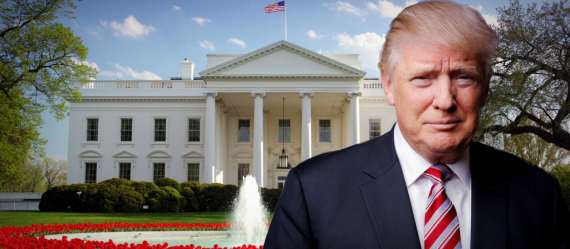

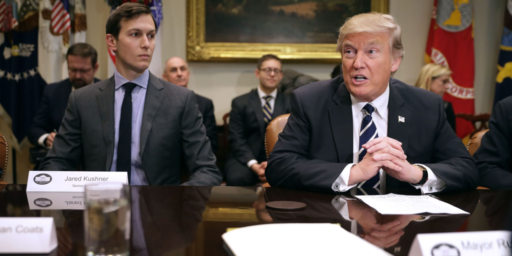
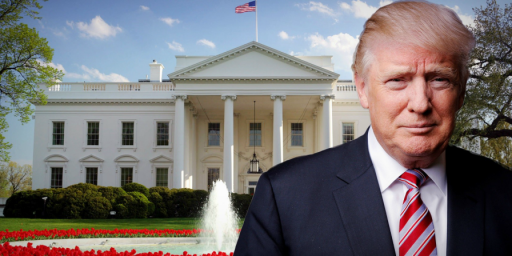
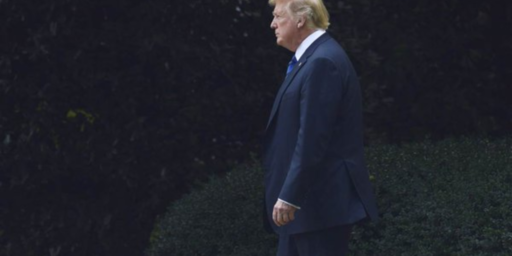

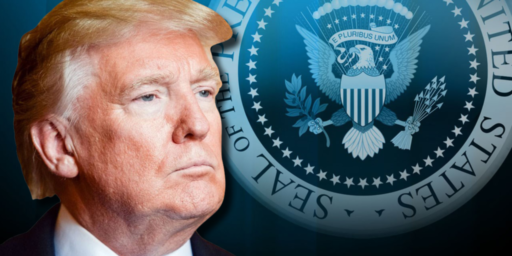
I guess this makes sense…given how insecure Denture-Donnie is.
That this has to be said out loud just goes to show how freaking incompetent these people are. That if one doesn’t have clearance, one shouldn’t be handling things that require said clearance should be a given, not a “it seems reasonable” I understand temporary clearances exist to give the process time to work but that should be a matter of weeks or months, not a year. I understand bureaucracy is a slow moving beast but come on – this is them gaming the system in blatant loophole abuse. Trying to pull this in the civilian world gets you fired PDQ
This is an incredible security risk that Republican are just shrugging off as “eh, it’s a temporary thing” It’s clearly not – many if not all of these people were obviously planning to skate by on temp creds for the length of their employment or this Administration’s. They knew damn well they weren’t gonna get cleared the legit way and yet they took their asses to work every morning to see how long they could get away with it. At what point do we start assuming bad faith on the part of their actions? At what point does it become unethical and in violation to work a job you *know* you aren’t allowed to but have a temp pass while we prove it?
Given the hyperventilation by every single Republican over Clinton’s handling of
classifiedconfidential documents…the hypocrisy here is awe-inspiring.“only the best people”
@Daryl’s other brother Darryl: A massive case of IOKIYAR.
One would hope the supposedly liberal MSM would learn and shine the same spotlight on this they did on HILLARY!! EMAILS!!!. One will be disappointed.
The most natural explanation is that many of these people don’t qualify for a security clearance.
Interim clearances are not automatic – they depend on a review of the material submitted by the subject as well as all the usual agency database checks for past criminal activity or any activity that would be derogatory to getting a clearance. If there is something there, then the interim isn’t supposed to be granted.
As the investigation goes along, if new information comes up, the subject will be interviewed about it and if that information is derogatory, then their interim clearance can be revoked depending on the circumstances. In that case, the investigation continues until it’s complete and only then it’s passed to adjudicators to a final decision.
Adjudication is separate from the investigation. Adjudication only happens when the investigation is complete.
Additionally, the timelines here are perfectly normal. A year is not at all unusual for an investigation – when I had my clearance, several of my periodic reviews took almost a year and these reviews only looked at the previous five years for a person who already had a TS clearance. I’ve seen investigations go as long as 18 months.
Classified info is supposed to be on a “need to know” basis regardless of if the clearance is an interim or not.
There are thousands of people working in the federal government right now with interim clearances. I’ve managed and processed hundreds of clearances during my time as a security manager. It is not that big of a deal. Before anyone gets access to classified information they must sign a non-disclosure agreement and they are subject to that agreement for life no matter what happens with their clearance.
In all, I think this is a non-story unless there is something more here – like people being improperly granted interim clearances. Additionally, we should keep in mind that the entire classified information and security clearance program is wholly a function of the Executive. Presidents can unilaterally grant access to classified information to anyone they wish – they are the final authority on such matters – and they often do when they want to consult outside experts.
@Andy:
For the White House? For people who will around with the most highly classified material in the freakin’ White House!?
If you seriously don’t think that the people working in the White House would be bumped to the front of the line, I have some development property on Mars to sell you.
@Andy:
Hmmmm…ain’t facts sumptin’
1) Trump hired third-rate nobodies because his only real criterion is slavish personal loyalty.
2) No one with a shred of dignity or instinct for self-preservation would work in this sh!thole of an administration.
Result: an incompetent administration full of back-stabbing and spite, all leaked in real time. And there is no solution, none of this will get better, it will only stay the same or get worse because no organization as complex as the American presidency can be run by the kinds of creeps, losers, frauds and desperate wanna-bes who comprise the entirety of Trump’s potential pool of applicants.
None of this should be a surprise. It’s 2 + 2 = 4. Insecure, unqualified, frightened presidents do not create smooth-running operations. It was never going to be anything but an unholy sh!tshow.
And frankly, thank God. Imagine what the baboon could do if he were even marginally competent.
Surely no one is surprised by all of this…Il Douche himself is incompetent so it stands to reason that his administration as well as those within it exhibit the same rank ineptness…
@Andy:
Now explain why people without clearance a year in are allowed to handle material with the highest level of classification.
See, your b.s. explanation that it’s all perfectly normal to have delays does not address the central issue. People without clearance, and people who will never get clearance, like the wife-beater Rob Portman, were given access to EVERYTHING. So, no, this is not a non-story. It is quite obviously not a non-story, which rather begs the question of why an intelligent fellow like you would insist that it is.
The WH knew Portman was a wife beater, and that wife beater had access to literally everything. He had blackmail potential written all over himself and an obvious lack of self-control, and access to everything. But that’s a non-story. Right. If this was Obama you’d be screaming treason. But as always, IOKIYAR.
@rachel:
It’s not a question of being bumped to the front of the line. These background investigations take a lot of time even when they are given priority and especially for older people who have a lot more things to investigate, as is the case with the WH staff.
As I mentioned, I used to process clearances. Investigations for the kids right out of high school who lived in the same house their entire life still often took six months.
In short there is a floor to how long an investigation will take no matter how many resources you throw at it. But there are also delays because the investigation system does not have enough capacity. The problems and under-capacity of the clearance processing system are legendary and go back many decades. This is another area that Congress and the Executive, under both parties, continues to neglect.
If people are actually interested in addressing this second problem, then that can be addressed by giving investigative agencies more resources to increase capacity.
@michael reynolds:
Because, unlike you, I actually know what I’m talking about when it comes to this subject. I’ve processed hundreds of security clearances and have seen just about everything that can happen. You may not like it, but my explanation is the way interim clearances work and that’s the way they’ve worked for a long time.
Keep in mind that interim clearances are always subject to revocation, hence the term “interim.” As an investigation proceeds, any derogatory information that is discovered is reported immediately and the interim clearance is immediately reevaluated. This is even true for final clearances. I’ve had people who were going through a routine periodic evaluation to re-up their clearance. Derogatory information was discovered and their access to classified information was immediately pulled.
Also, interim clearances aren’t automatic and the criteria for granting them varies by agency.
That’s the system, it’s been this way a long time.
Wow, Michael, you’ve really become unhinged. I’ve never said or thought anything remotely like that about President Obama. I even voted for him in 2008. I think you should probably just keep your wrong opinions and characterizations about me to yourself and I’ll extend you the same courtesy.
@Andy: Andy, since you have experience I have a simple question. One of these interim clearances was given to a man who attempted to set up backchannel discussions with the Russians through their embassy in order to avoid the possibility of the US government finding out what they are talking about. This is known because one of our security agencies intercepted communication between the Russian Ambassador and the Kremlin that outlined the situation. Under any other circumstance, would such a person be granted even an interim security clearance at the very highest levels of secrecy?
@Kathy: Indeed, which means that they don’t meet the minimal requirements for the jobs that they hold. It’s an incredibly cavalier attitude towards national security.
@Andy:
Gee, so many huffy words and yet no answer to the simple question I posed:
And no answer as to why it’s a non-story that the most classified of documents were passed through the hands of a man the White House KNEW to be a wife beater.
If you have answers, let’s hear them. Otherwise I might ‘characterize’ you again.
@MarkedMan:
In my experience, no, but I never saw something similar to that. This was a FISA action and thus it bridges the divide between intelligence and law enforcement. I don’t know what kind of access clearance investigators and adjudicators have to FISA information. It may be that the right hand didn’t know what the left hand was doing, but that would be speculating – I honestly don’t know.
That would be a good question to ask whoever approved the interim and I don’t know who that authority is when it comes to the WH staff.
However, in general, foreign contacts are considered a pretty big deal and generally, a subject must answer a lot of questions about the scope and extent of any foreign contacts before an interim is granted. It could also limit the scope of the interim to a lower classification level or prohibit access to certain compartmented information.
@Andy: “I’ve processed hundreds of security clearances and have seen just about everything that can happen”
Have you processed any for direct reports to the POTUS? Not disagreeing so much, but have seen some clearances go faster than most – some move quicker than others and am sometimes puzzled as to why – you would think these would be important to close out quickly due to the nature of the people involved, but perhaps interim delays due to the complexity – but you would have to expect incoming personnel reporting to the POTUS would get some type of expedited urgency, not just treated as ‘just another clearance”
@michael reynolds:
I did answer it. That’s what interim clearances are for. Interim clearances are intended to allow people to do their jobs while the investigation proceeds, assuming there are eligible for an interim. That’s why people (not just people in the White House, but people at all levels of the federal government) are allowed access to high level classified information with an interim clearance.
Go back and read what I actually wrote. The non-story is about the clearance processing timelines. I never said that employing a wife-beater is a non-story, this is you, once again, trying to put words into my mouth. I do not, have not and will never ever defend this White House when it employs people who shouldn’t be in government and Porter fits that bill.
Yes, security clearances take time–just not this much time in the past. In December 2016, the Obama administration reported it took an average of 166 days to complete an initial investigation, 246 days to finish an initial investigation at the top secret level and 222 days for a periodic reinvestigation. That is up from 2015 when on average it took 95 days for initial secret investigation and 179 days on average for a top secret clearance. According to multiple sources 8 months to a year are common.
We are now well beyond that, but we don’t have exact figures anymore, because: “OPM was mandated to periodically publish figures on the backlog until June 2017, when Office of Management and Budget Director Mick Mulvaney rescinded the rule in a sweeping rollback of “duplicative and burdensome reporting requirements.” ”
One of the main problems seems to be that we used to contract a lot of the background work, but hacks back in 2013/2014 at the USIS contractor exposed background check data for approximately 60% of employees going through the background check process. The contract was terminated, but the process has been falling behind ever since since the OMB itself lacks the resources it needs to process everything in house. There are multiple bills in Congress (stalled, as usual for that useless body) to address the issue, and have been for over a year now.
@Jc:
I have not processed clearances for the White House.
Like you, I would expect WH staff to be expedited but, as I mentioned before, there are limits to how fast you can make the process. This is true of any investigation, not just for personnel security clearances. That would be a good question to ask whoever is in charge of managing the WH investigations, which I assume is OPM.
@Andy: Did you understand I was talking about Jared Kushner who still has access to the very highest level of secret documents including those concerning Russia? Are you saying that if you were in charge of his interim security clearance that you would have trouble deciding? He literally tried to set up a clandestine channel to the Russians through their embassy in an attempt to shut the US government from knowing what they were discussing. Are you honestly telling me this is a hard call?
@Just Another Ex-Republican:
That’s a good comment. The clearance process has long been troublesome.
@MarkedMan:
I’m not sure what you’re talking about. I never said it was a hard call. You asked:
I answered:
@Andy: Fair enough. I took from your additional comments about FISA courts that you were temporizing your opinion and rationalizing that there might be some legitimate reason for Kushner to still hold his temporary security clearance. If that is not the case, then I apologize.
OT…holy fvck…the noose just got a lot tighter…
https://www.thedailybeast.com/mueller-indicts-13-russian-election-trolls?ref=home
@MarkedMan:
No worries, I was just pointing out a potential caveat.
Like I mentioned, it would be useful to know who the decision authority is for WH interim clearances. I doubt it is some civil servant in OPM.
Thank Dog Hillary wasn’t elected. We would have been mired in scandals left and right, FBI investigations would be striking at the very heart of our electoral system, efforts at obstruction of justice would be a daily occurrence in both Congress AND the White House, and National security would be getting violated every other day, probably with Russians in the OVAL OFFICE!!!! And I haven’t even mentioned the moral quagmire that is the entire Clinton family!
We really dodged a bullet this time.
@Andy: I would bet dollars to donuts that the final reason Kushner and the other Russian coconspirators still have clearance I’d because of a memo squirreled away somewhere that says “Because Trump says so”
@MarkedMan: I bet you’re right. The word of the president carries a lot of weight in such matters, similar to the way he can arbitrarily declassify anything. There seems to be zero respect for security concerns as well as a variety of norms and the office itself. It’s like the Manhattan Hillbillies moved in.
@MarkedMan:
Actually, Trump has the authority to do just that. The classified information system is entirely owned by the Executive branch and governed by EO. The President has the authority to declassify anything or give anyone access to whatever he wants. The only requirement is that the person given access must sign an NDA. Presidents in the past have done that only on rare occasions, however.
@Andy:
1. Can the President suspend the NDA requirement?
2. What is the point of having a “classified” status for White House staffers at alll, if the President can declassify at his whim when it suits his convenience?
3. Follow on to #2: Does it really make any difference whether a staffer has interim, temporary or permanent security clearance, because the President can “order” any staffer to do anything (the President desires) with regard to classified documents or listening to classified discussions.?
@Bob@Youngstown:
Your questions got me thinking, I went back and researched and found that the NDA requirement is also governed by EO and Presidential directive. I had thought it was written into federal law but it is not. So,
1. In theory, yes. I’m not an expert on EO’s, but in theory, President Trump could issue a new EO with different requirements (President Obama’s EO is still in effect). Without a new EO, I don’t know – maybe HarvardLaw or a lawyer familiar with such things can tell us if a President can suspend part of one his own orders on a case-by-case basis.
I personally don’t think that anyone should have daily access to classified information without signing an NDA, even at the White House level. I’ve never seen it happen. We even had procedures for getting firefighters to sign NDA’s (after the fact of course), if they had to enter our secure facility to fight a fire. NDA’s are, as Biden would put it, a big effing deal.
2. Declassification would make the information public and therefore subject to FOIA. There’s no mechanism to just declassify information for certain people – instead what happens is that information is disclosed to people by someone with the authority to do so. The President is the highest authority when it comes to such decisions.
To give one example, suppose there is a crisis in some part of the world that’s not normally on our government’s radar. Executive agencies or even the White House itself may ask experts, businesspeople familiar with the region, or academics to consult as experts on the crisis. The President, or his/her designee, could authorize disclosure of classified info to those people who are helping.
3. There isn’t a day-to-day difference in most cases. Interim clearances are designed to allow people to have the access they need while the investigation progresses and is contingent on the absence of disqualifying information. Sometimes an interim will not grant full access to the most sensitive programs, it really varies by agency. I don’t know how the White House does it.
Just as one example from the last administration – Ben Rhodes, one of the President Obama’s national security staffers, was not eligible for an interim for some reason. This fact was discussed in one of John Podesta’s hacked emails published by Wikileaks. In the emails, as I recall, Podesta decided not to challenge the determination to deny an interim. In theory, he could have gone to the President and asked him to overrule the determination, but he didn’t. Rhodes presumably got his final clearance at some point and everything was kosher.
So the question is, did Rhodes really have zero access to classified information despite being in the White House and as part of the National Security Staff? It seems really unlikely to me, but no one knows. And, in my opinion, it doesn’t really matter – if President Obama wanted him in a meeting or wanted him to know something, Rhodes would know it and there is no one who can question or overrule the President’s authority to make that decision. That is, I think, as it should be.
Trump’s problem is he’s got some dirt-bags in his administration, and the clearance process is exposing them which has become a political problem for him. Could President Trump keep Porter, for example, on staff and give him access to classified information? Yes, I’m pretty confident President Trump has that authority, but obviously, he would pay a huge political price if he did that.
I hope that’s clear. The system and rules are confusing as hell…
@Andy: What I think I’ve learned is that the President can declassify “on-the-fly”, which then leads to the question can the President reclassify “on-the-fly”.
Consider momentarily this scenario: The President is in a meeting with Homeland Security, CIA, and others who all have permanent and highest security clearance (equal to or exceeding that of the President). Also in attendance is Jared Kushner, because some of the discussion may relate to middle-east peace initiatives. The CIA chief begins to talk about a human intelligence source within Mossad, that has provided information concerning a US homeland threat that has just been uncovered.
I would submit that Jared has “no need to know” the source of this information (Mossad) and more specifically the identity of the person (or the ability deduce that identity). He may not even have a “need to know” that a threat has recently been uncovered.
Given that hypothetical: Does the President (a) tell Kushner to leave the room , (b) by default “declassify” the discussion (enabling all the participants to freely discuss) and then at the conclusion of the meeting announce that this discussion and it’s contents are “classified”, thereby reclassifing, and shielding the discussion and it’s contents from FIOA.
I guess the best way to express this question is: As it pertains to the President and his staff, is security clearance and classification largely transactional, depending on what he feels is convenient at the moment?
@Bob@Youngstown:
Understand the President doesn’t just control classification but also access. In theory, he can grant anyone access to classified information without declassifying it. As I said, there is no procedure to declassify information and then suddenly reclassify it. If you reclassified something, then Kushner would still know classified info and you’d be back at square one.
Instead what would happen is the President would simply authorize the person to have the info despite it being classified. He doesn’t need to declassify it first.
The same thing happens in relations with foreign governments. Presidents and cabinet officials frequently discuss classified information with foreign partners and governments. The information doesn’t become unclassified – rather the information was legally disclosed consistent (we would hope) with American national security as authorized by the President (or Vice President).
@Andy:
That seems to answer my question, thanks.
However, do you suppose that ‘presidential authorization’ needs to be in writing, or in my hypothetical above, can the President authorize (grant need to know) by simply not asking Kushner to vacate the room? Asked another way, does the President need to take affirmative action to grant “need to know”?